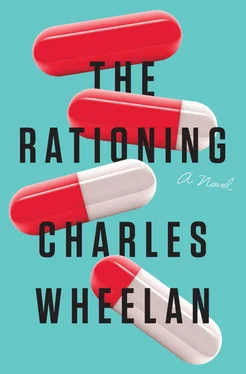“What about the China option?” she asked.
“We are still looking at that. There is a consensus among my foreign policy advisers that it would be far too steep of a price to pay in the long run. You heard some of those discussions.”
The Senate Majority Leader asked, “Is the China offer public information at this point?”
“No,” the President said emphatically. “And I’d prefer to keep it that way. Among other things, we don’t actually have a firm offer in hand.”
The House Speaker said, “I cannot in good conscience withhold that information from the House, or from the public. If China is offering lifesaving medicine, the public needs to know that.”
The Chief of Staff walked back into the room and thrust a piece of paper in front of the President. It had a big “0” written on it—nothing else. The President understood immediately. He said sharply into the speakerphone, “We’re now at zero deaths. I have a speech to give. All of the discussions with the Chinese are confidential. If you so much as hint at that in your public comments, I will personally have you arrested.” He poked at the console on the speakerphone, trying to end the call, but he hit the wrong button, causing a loud beeping noise. The Strategist quickly stepped beside him and hit the correct button, hanging up on the Speaker and the Majority Leader.
The Chief of Staff began explaining: “The NIH revisited their projections for the number of people who would seek—”
“I don’t want to know,” the President said, walking out of the room. “Let’s do this.”
I FOUND MY WAY TO THE RADIO STATION IN PLENTY OF TIME, even before the President pushed back the time of his address. The studio was smaller and less elaborate than the CNN facility. I waited in a sitting area with three large flat-screen televisions, each tuned to a different news station. A handful of station employees stood idly watching with me, waiting for the President to appear on camera. The address was postponed another five minutes as the President’s staff (unbeknownst to the public) wrestled with the teleprompter issue, or more accurately the lack of a teleprompter. The President’s handwritten remarks had been quickly typed up, but the font was too small for him to read without his glasses. There was a debate among the staff over whether it would be better for the President to wear his glasses, something the public had never seen before and might distract from the message, or to have the speech printed in large enough font for him to read without glasses. The latter seemed an easy fix, but the font turned out to be so large that there were only a few sentences on each page, creating a strange effect whereby he had to flip rapidly through many pages while saying relatively little. “It looks like he’s reading a speech written in crayon by a kindergartner,” the Communications Director said. In the end, the President wore his glasses. The reading glasses produced no meaningful public reaction. However, the public had been so conditioned to leaders using a teleprompter that there was some comment on the fact that the President read from an actual speech, looking down at the pages and then up at the camera.
In the studio, a producer sidled up to me as I waited for the President’s speech to begin. “Have you ever done a satellite tour before?” he asked.
“I don’t even know what it is,” I said.
The producer pointed to a chair opposite a microphone in the middle of a small room surrounded on three sides by soundproof glass. “You’re going in there. I’m going to be in the booth. We’re going to do fourteen segments in about ninety minutes, mostly AM news programs, a few public radio segments. All live. If you mess up, just keep going. After you finish each interview, keep quiet and I’ll patch you into the next one.”
The President began his address and we all turned toward the televisions. Someone scrambled to find a remote to turn on the volume. The producer said to me, “When he’s done, we’re going to go right into the studio. You’ll be fine.”
I looked down at my phone as the President’s voice boomed into the room. Tie Guy had sent me another text: “Nature strikes back. Call me!” I quickly texted back that I would call him after I finished my radio interviews. Nature strikes back? Why was he quoting Huke to me?
The President’s speech was clear and authoritative, if somewhat short on artistry. There were no ringing phrases like “a day that will live in infamy” or the “axis of evil.” Instead, the President did what he had to do, explaining Capellaviridae , the nature of the Dormigen shortage, the need for anyone who felt ill to seek treatment, and most important, the ongoing government response. The penultimate draft included the line: “I will do everything in my power to ensure that no American lives are lost.” The Secretary of State had pleaded with him to remove or change the line. “It will make it that much harder to stand firm with the Chinese,” she argued. Both the National Security Adviser and the Secretary of Defense concurred.
“People have died already,” the Chief of Staff reminded him.
“Obviously,” the President snapped. “This is about the Dormigen shortage.”
“Maybe we need to say that,” she suggested.
The television networks were getting impatient, as they had already interrupted their scheduled programming for nearly half an hour. “How about this?” the Strategist offered. “I am confident that we can weather this crisis without any preventable loss of life.”
“Yes,” the President agreed.
“That’s a bit of a stretch, isn’t it?” the Chief of Staff asked. “How about ‘preventable loss of life from the shortage—’”
“Too clunky,” the President said. “I’m comfortable with this. It’s what people need to hear right now. Today is about quelling the panic.”
“Sir, I think that leaves you in a better position with regard to the Chinese,” the National Security Adviser said.
The Chief of Staff, still uncertain, said, “Only the lower bound of the model shows no loss of life. Everything has to go our way.”
The President said, “The speech says, ‘ I am confident we can weather this crisis without any loss of life.’ It’s about how I feel right now. I am confident that we are going to get through this without any preventable loss of life. That’s what I’m asserting.”
“Yes, that’s right,” said the Strategist.
The President, no doubt feeling a rising surge of adrenaline, said impatiently, “I’m ready. This is the speech I’m giving.” I do not believe it is a coincidence that the President was an extraordinary basketball player. He had the ability to harness his anxiety in a way that elevated his performance, rather than smothering it. He may have looked somewhat awkward reading his speech off the printed page, but his demeanor and the message were pitch-perfect. I watched with a small, nonrepresentative group of people in the radio studio, but the feeling in the room after the President had spoken was different than it had been just seven minutes earlier. The brevity of the speech gave it additional power. The President did not have the eloquence of FDR or JFK, but he explained clearly what was happening and made a short but compelling case that the situation was under control. The immediate headlines suggested a public reaction similar to mine. Even before the President was done speaking, Bloomberg posted a one-paragraph summary of the speech under the headline: “President Urges Calm, Predicts No Loss of Life in Capellaviridae Crisis.” The stock market, which had plunged more than 5 percent on the initial reports of the Outbreak, regained most of the losses.
Читать дальше












